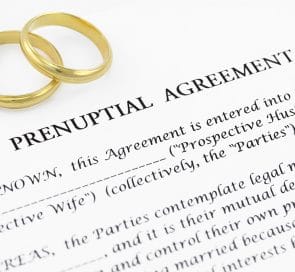Are Prenuptial Agreements legally binding in England & Wales?
A prenuptial agreement is a formal contract between two people prior to marriage or civil partnership, which sets out how their finances will be organised in the event of the breakdown of the marriage.

Prenuptial agreements (PNAs) are not legally binding in England and Wales. This is in marked contrast to many jurisdictions, including Scotland, the rest of Europe and in most other jurisdictions where PNAs are regulated by law and are therefore commonplace. However, PNAs are regarded by courts as persuasive and often decisive as to what the parties intended, following the breakdown of a marriage/civil partnership.
Historically, it was regarded as contrary to public policy for a couple who were about to get married to make an agreement that provided for what would happen if they were to separate. It was thought that an agreement making provision for separation might act as an encouragement to separate. In the past, therefore, such agreements were void and the court would pay no regard to them.
Times have changed, and this is certainly no longer the position accepted by the courts. Many people entering a marriage with the sense and foresight to consider what would happen if things go wrong, wish to enter into these agreements, akin to insurance policies, to try to protect their financial position in the event of divorce. Despite appearing somewhat unromantic, this safety net offers a constructive alternative to what could otherwise be protracted, expensive and uncertain legal proceedings.
Will my prenuptial agreement be upheld in Court?
If the agreement has been properly drawn up and various key criteria met, you can expect the agreement to be fully taken into account and the terms upheld.
Since the landmark Supreme Court decision in Radmacher v Granatino 2010 [2010] UKSC 42 the use of PNAs in the UK has grown rapidly. In Radmacher, the court said:-
“The court should give effect to a nuptial agreement [PNA] that is freely entered into by each party with a full appreciation of its implications unless in the circumstances prevailing it would not be fair to hold the parties to their agreement”.
In order to maximise the prospect of a court upholding the agreement, the criteria that should be included are:-
- The Agreement must enable the financially weaker party (and any children) to meet their needs.
This is perhaps the main and most important consideration. If the agreement does not enable the party and children to meet their needs following a divorce, then the court are unlikely to uphold the agreement terms, even if all of the other formalities have been met. The court will be able to add to the financial provision contained in the agreement to meet needs.
- Parties must not be under any undue pressure or influence to enter a PNA. The parties must enter into the agreement of their own free will and there must not be any undue influence or duress to sign the document.
- Timing. It is also essential that both parties have sufficient time to consider the terms of the document. A PNA should be signed at least 28 days prior to the wedding. If you are contemplating a PNA, I would suggest you consult with a lawyer a minimum of three months in advance of the wedding.
- Financial disclosure. Both parties will need to provide disclosure of all of their financial circumstances (assets, liabilities, income) before the agreement is signed.
- Legal Advice. Whilst this is not mandatory, it is highly advisable that both parties should take legal advice at the time the agreement is drafted in order that they fully understand the document, the terms and its implications.
- Contractual validity. The agreement must be capable of being enforced as a contract.
- Execution. The agreement must be executed as a Deed.
If prenuptial agreements are not strictly legally binding, why would anyone enter into one?
PNAs can carry decisive weight. Case law is increasing in this area, and judges are showing a willingness to respect the wishes of the parties based on agreements freely entered into (and which meet the criteria above). Even if the court decide to make further financial provision than in the agreement, to meet needs, it is likely that the additional award will be as narrow as possible, as the courts recognise that the aim was to limit the provision in the first place. It is a different approach to that taken in a case with no PMA.
What happens if my circumstances change dramatically since the time I signed a PMA and the time of separation?
If there is a significant change, such as illness or disability that affects ability to earn, or a big change in asset values (greater or less) than at the time of the PNA, then the court can adjust financial provision from that set out in the agreement.
Our family law team have experience in drafting PNAs from the most straight forward of documents to complex documents involving trusts and company assets. We are also increasingly being instructed by clients who have agreements drawn up in other jurisdictions and need an identical agreement in England and Wales.
If you would like independent family advice regarding a prenuptial agreement please contact our specialist family law team on 0330 822 3451.


